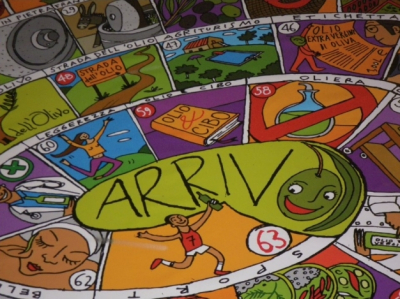Young tasters
While it is sometimes difficult to teach adults to discern the aromas of olive oil, children are more spontaneous and free of prejudice. It is easier to discern scents and aromas if we have fewer “perturbing factors”. Teaching is easier when the students have no previous knowledge or preconceptions

My elder daughter has just turned five. At this age children are like little sponges, soaking in information and thirsty for new knowledge. My little one in particular is now at a stage where she wants to learn to read independently, and constantly seeks our help to accomplish her mission.
This is a clear example of our inclination to self-learning, common in all humans.
These are just some of the thoughts that came to my mind after an episode that occurred this morning. I am in the habit of involving various members of my family when I taste oil, and this includes my elder daughter… indeed, it will soon be the turn of the younger one too!
This morning we tasted two oils.
The first one I sampled was characterized by green sensations and a pungent flavour. I then passed it to my daughter and after declaring that it smelled nice, she proceeded to taste it, saying that it “stung”.
Nothing strange up to then, just the usual exchange of opinions we have when we have these at-home oil-tasting sessions.
I then proceeded to examine the second sample, an Ascolana tenera single varietal oil. I tried to discern every component of its bouquet, then after tasting it I passed the glass to her, while I jotted down my sensations.
I noted “intense fruitiness, sensations of grass and tomato leaf”. While I was writing down these observations, my daughter took one sniff at the oil and exclaimed: “this oil smells of tomato!” What a moment of joy! How proud I was!
It was probably easy for her, she loves tomatoes, and takes big bites out of them since she was two years old.
Yet it was nice, especially considering how difficult it often is to teach our students to discern the descriptors and characteristics that a panel of experts would identify in a sample of olive oil.
It can be very hard, and I have got used to seeing a look of bewilderment in their eyes, as if these features were figments of the imagination of us judges or teachers.
I intend to share this little episode with my future students, because it gives rise to some considerations.
If we are used to a given scent (tomato, almond, grass, and so forth) and are used to recognizing it, we find it easier to discern it among other scents that all together form a more complex combination (a recipe, for instance, but also an extra virgin oil with a rich and varied bouquet).
It is also easier to discern scents and aromas if we have fewer “perturbing factors”. Teaching is therefore easier when the students have no previous knowledge or preconceptions.
The picture at the top shows a detail of the Oil Game at the Olio Officina Festival
To comment you have to register
If you're already registered you can click here to access your account
or click here to create a new account


Comment this news